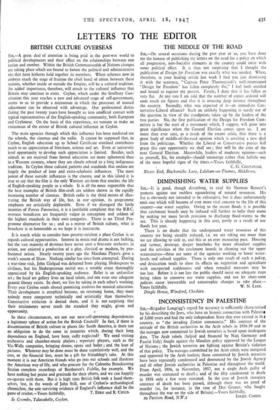LETTERS TO THE EDITOR
BRITISH CULTURE OVERSEAS
Sm,—A great deal of attention is being paid in the post-war world to political developments and their effect on the relationships between one nation and another. Within the British Commonwealth of Nations changes are taking place which are bound to loosen the political and administrative ties that have hitherto held together its members. When schemes now in embryo reach the stage of fruition the chief bond of union between these nations, whether inside or outside the Empire, will be a cultural tradition. An added importance, therefore, will attach to the cultural influence that Britain may continue to exert. Ceylon, which under the Soulbury Con- stitution this year reaches a new and advanced stage of self-government, seems to us to provide a microcosm in which the processes of mutual adjustment can be observed with advantage. Our professional duties during the past twenty years have brought us into unofficial contact with typical representatives of the English-speaking community, both European and Ceylonese. On the basis of this experience, we venture to make an assessment of the extent of British cultural influence in Ceylon.
The main agencies through which this influence has been mediated are the schools, the cinemas and the radio. It cannot be supposed that, in Ceylon, English education up to School Certificate standard contributes much to an appreciation of literature, science and art. Even at university level opportunity to develop such appreciation is limited. Besides, such stimuli as are received from formal education are more ephemeral than in a Western country, where they are closely related to a long indigenous tradition. In Ceylon those cultural patterns and standards that endure are largely the product of later and extra-scholastic influences. The most potent of these outside influences is the cinema, and in this island it is true to say that the film is the only Western art-form that touches the life of English-speaking people as a whole. It is all the more regrettable that the best examples of British film-craft are seldom shown in the rapidly increasing number of cinemas. British radio is the third means of illus- trating the British way of life, but, in our' opinion, its programme emphases are artistically deplorable. Even if we disregard the futile inanities of Forces Favourites, it is a justifiable complaint that the B.B.C. overseas broadcasts are frequently vulgar in conception and seldom of the highest standards in their own categories. There is no Third Pro- gramme alternative for us ; and as a mirror of British culture, what is broadcast is as lamentable as we hope it is inaccurate.
It is worth while to consider how poverty-stricken a place Ceylon is as regards cultural opportunities. Interest in music and drama is not lacking, but the vast majority of devotees have never seen a first-rate orchestra in action, nor enjoyed a production of a play, classical or modern, by pro- fessional artists. Nearly twenty years ago the Macdona Players gave a week's season of Shaw. Nothing similar has since been attempted. During a war-time visit, John Gielgud was debarred from playing Shakespeare to civilians, but his Shakespearean recital was a notable event thoroughly appreciated by his English-speaking audience. Ballet is an unfamiliar art ; the local' art, gallery lives on local talent, and not even one adequate general library exists. In short, we live by taking in each other's washing. Every year Ceylon sends abroad promising students for musical education. Their development is atrophied because, on returning home, they meet nobody more competent technically and artistically than themselves. Constructive criticism is denied them, and it is not surprisng that their attainments never reach the standard they might, given real
opportunity. s In these circumstances, are not our near-self-governing dependencies a legitimate sphere of action for the British Council? In fact, if there is dissemination of British culture in places like South America, is there not an obligation to do the same in countries which, during their long dependence on England, have been sadly neglected? We need visiting orchestras and chamber-music platers ; repertory players, such as the Vic-Wells companies, bringing drama, opera and ballet ; and the loan of pictures. Whatever may be done must be done superlatively well, and the cost, or the financial loss, must be a gift for friendship's sake. At this moment it is our American friends who go into our schools and illustrate the American way of life, and who procure for the Colombo Broadcasting Station complete recordings of Beethoven's Fidelio, for example. We have nothing but praise and gratitude for their efforts, and we can happily co-operate with them. But it is high time British folk took a hand them- selves, lest, in the words of John Still, one of Ceylon's. archaeological chroniclers, the sole surviving evidence of England's influence shall be the St Coombs, Talawakelle, Ceylon.


































 Previous page
Previous page